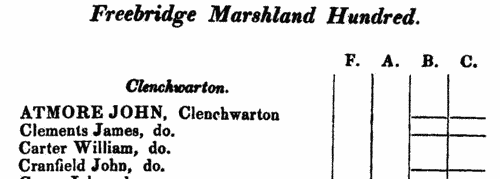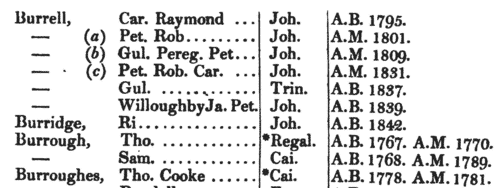Add this eBook to your basket to receive access to all 96 records. Our indexes include entries for the spelling bransby. In the period you have requested, we have the following 96 records (displaying 71 to 80): These sample scans are from the original record. You will get scans of the full pages or articles where the surname you searched for has been found. Your web browser may prevent the sample windows from opening; in this case please change your browser settings to allow pop-up windows from this site. Dissolutions of Partnerships
(1837)
Trade partnerships dissolved, or the removal of one partner from a partnership of several traders: in England and Wales
| Sample scan, click to enlarge

| Voters in the Western Division of Norfolk, for the parish of Emneth
(1837)
Under the Reform Act of 1832, the County of Norfolk was allotted four Members of Parliament, being two Knights of the Shire for the Eastern Division and two for the Western. The Western Division included the hundreds of Brothercross, Clackclose, Freebridge Lynn, Freebridge Marshland, Gallow, North Greenhoe, South Greenhow, Grimshoe, Guiltcross, Holt, Launditch, Mitford, Shropham, Smithdon and Wayland. Polling in 1837 took place at Swaffham, Downham, Fakenham, Lynn Regis, Thetford and East Dereham. The franchise was available to freeholders worth 40s a year or over; copyholders and long leaseholders of £10 or more; short leaseholders and tenants of £50 or more: but limited to adult males. Voting took place on 1 and 2 August 1837. This poll book lists the voters for each parish, with the votes cast. Each voter had two votes: the votes are indicated in the columns F. (Sir William Henry Browne Folkes, 2838); A. (Sir Jacob Astley, 2713); B. (William Bagge, 3178); and C. (William Lyde Wiggett Chute, 2877). The voters were not necessarily resident in the parish, but derived their franchise from the land there; so some of the names have addresses outside the parish, not a few living in different counties. Not everyone voted, but everyone with a vote was listed in the poll book: persons who qualified for voting in two parishes (but nevertheless had just the one vote per person) are noted as such. | Sample scan, click to enlarge

| Electors of Newton Flotman
(1840)
The register of electors entitled to vote in any parliamentary election for East Norfolk between 1 November 1840 and 1 November 1841 lists 8,556 freeholders arranged by hundred and within hundred by parish or township &c. In the first column, after number within the register, the elector's name is given (surname first); the second column gives place of abode; the third column the nature of qualification (such as 'owner and occupier'); and the fourth column the address of the qualifying property, in some cases with the name of the tenant or occupier. | Sample scan, click to enlarge

| Bankrupts' Assignees
(1842)
Assignees of bankrupts' estates (usually principal creditors and/or close relatives of the bankrupt) in England and Wales | Sample scan, click to enlarge

| Dissolutions of Partnerships
(1842)
Trade partnerships dissolved, or the removal of one partner from a partnership of several traders, in England and Wales
| Sample scan, click to enlarge

| Deaths, Marriages, News and Promotions
(1845)
Death notices and obituaries, marriage and birth notices, civil and military promotions, clerical preferments and domestic occurrences, as reported in the Gentleman's Magazine. Mostly from England and Wales, but items from Ireland, Scotland and abroad.
| Sample scan, click to enlarge

| Graduates of Cambridge University
(1760-1846)
Joseph Romilly, registrar of the university of Cambridge, compiled Graduati Cantabrigienses, a catalogue of graduates from the academic year of admissions 1760 through to 10 October 1846. The names are arranged alphabetically by surname, and then chronologically by christian name: the college is given, with an asterisk in those cases where the man became a fellow, and then, in chronological order, his degrees. | Sample scan, click to enlarge

| Railway Subscription Contracts
(1846)
£121,255,374 0s 8d was promised by about 8,000 subscribers of more than £2,000 to the nearly 556 railway bills deposited in the Private Bill Office during the Session of Parliament for 1846. This alphabetical list gives the full names of the subscribers (surname first), description (i. e., occupation), place of abode, a numerical reference to the title of the railway, the amount subscribed to each, and total. There is a separate key to the titles of the railways. | Sample scan, click to enlarge

| New South Wales Intestates
(1849)
The probate courts of the Australian colonies furnished returns of estates of deceased intestates, giving full name, colonial residence, supposed British or foreign residence of family (often unknown, or left blank), amount of the estate and how much had been disbursed and how. The date of death is often stated, and if by accident, suicide or crime. Names were carried forward from return to return until the estate was expended or exhausted. | Sample scan, click to enlarge

| Dissolutions of partnerships in England and Wales
(1850)
Perry's Bankrupt and Insolvent Gazette, issued monthly, included lists of dissolutions of partnerships gazetted in England and Wales. The names of the partners are given in full, surnames in capitals, followed by trade and address, and date of the end of the partnership. Each entry usually ends with the phrase 'Debts by ...', indicating which partner intended to continue, and resume the responsibilities of, the business. This is the index to the names of the partners, from the issues from January to December 1850. | Sample scan, click to enlarge

|
Research your ancestry, family history, genealogy and one-name study by direct access to original records and archives indexed by surname.
|











